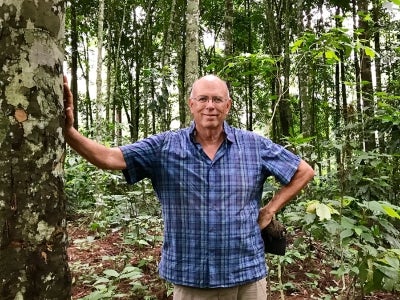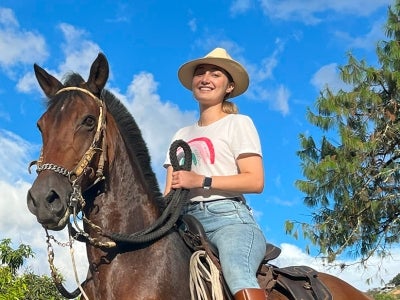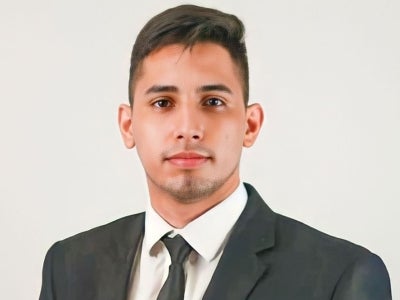
Sandy Andelman speaking at a training workshop in Tanzania
Sandy Andelman is Vice President for Conservation Strategy and Partnerships at the Wildlife Conservation Society, an NGO working in 65 countries to protect wildlife and wild places through science, conservation action, education, and inspiring people to value nature. In an interview, she reflected on her work as a member of the GEF COVID-19 Task Force and shared how observing small apes sing in an Oregon zoo started her on a path of scientific inquiry that continues to motivate her decades later.
How has the COVID-19 outbreak impacted your work?
I feel incredibly fortunate that I am able to continue working with colleagues around the world, even if it is now virtually through Zoom. Work hasn’t slowed down. If anything, it has increased. But now, instead of getting on a plane and flying across the world to spend time with our partners and supporters, I am now spending time on calls with collaborators in Africa and Europe around 6 am, followed by calls with New York and Washington colleagues, and beginning around 5 pm with colleagues in the Mekong, Indonesia, and Singapore.
Is there a GEF-supported project that is close to your heart?
There are many. At the moment I would say the recently approved project on Integrated Watershed Management of the Putumayo-Iça River Basin. This project aims to ensure the ecological integrity and connectivity of the entire Putmayo-Iça Basin for the benefit of wildlife and people. The Putumayo-Iça is a free flowing river. This is a big pristine tropical forest covering 118,000 km – more than twice the size of Costa Rica – and the basin is significant for its forest and freshwater biodiversity and for indigenous peoples. The World Bank is the implementing agency for the project and the Wildlife Conservation Society will lead the project’s execution, in partnership with the four national governments in the area – Brazil, Colombia, Ecuador, and Peru – and many stakeholders engaged in the initiative.
You are a member of the GEF’s COVID-19 Task Force. What is distinctive about this work?
In creating the Task Force, the Global Environment Facility has created a virtual think tank on COVID-19. Over several months we have been exploring the many dimensions of the pandemic, from an interdisciplinary, multi-level, multi-stakeholder perspective, i.e., a systems perspective. Not only is the Task Force informing the GEF Secretariat, I and other members are learning a huge amount from one another and it has given all of us a new frame of reference for responding to COVID and for thinking about post-COVID recovery, including how to meaningfully engage with indigenous peoples during times of public health crisis.
 Sandy Andelman in a group photo with colleagues from the Vital Signs Tanzania team
Sandy Andelman in a group photo with colleagues from the Vital Signs Tanzania team
Did you always know you wanted to work on environmental issues? How did you get into the field?
My father was a doctor in the days when doctors made house calls, then saw patients in the hospital, then saw more patients in the office and then made more house calls. The way he recharged was by going fishing in the most remote places he could find, and I was lucky enough to go with him. Starting university in Portland, Oregon, I took a class studying the behavior of animals in the zoo. I chose to study gibbons and became fascinated with the question of why the small apes sing like birds. My professor told me I would never answer that question sitting in the zoo. I would have to go and study gibbons in the rainforests of Southeast Asia. So I went to the library to read journals and find out which professors studied them, and wrote letters volunteering to be a field assistant. One, David Chivers, said yes – so when I was 19 years old I went to the Krau Game Reserve in peninsular Malaysia to work as a research assistant, helping his graduate students who were studying gibbons. That was my first experience in a tropical forest and outside of the United States. I have been working to understand tropical wildlife and ecosystems ever since.
What life lessons has your work life taught you?
Much of my work the past three decades has been at the interface of science, conservation and sustainable development, bringing together diverse networks of individuals and institutions from different disciplines and sectors to tackle complex problems. This work has taught me that today’s environmental challenges can’t be solved project by project or sector by sector. They require systemic solutions. The challenge is that most of us were trained in school to study a single discipline, such as ecology, economics, computer science, and we learned the language of our discipline, and to communicate with others interested in similar studies. But we won’t succeed in sustaining nature if we focus species-by-species, or ecosystem-by-ecosystem. We need to transform our relationship with nature. For example, it is not a question of where to conserve biodiversity and where to produce enough food for people – we need to redesign our food systems to explicitly consider nature.
Is there a person you have met through your work who had a lasting impact on you?
One person who comes to mind is Sam Dryden, who led the agricultural development program at the Gates Foundation for several years before his untimely death. Sam was a visionary thinker and he was one of the most generous and humble people I have met. He was an unlikely conservationist, having grown up on a tobacco farm and spent most of his career as a biotech investor and entrepreneur. Sam helped me to understand that to create lasting change I have to be able to work simultaneously at multiple scales and to understand diverse perspectives, from individual community members, to heads of state and business leaders. I had the privilege of traveling with Sam in several African countries and he was always having a conversation and learning from everyone he met. His approach to leadership and creating change was by listening and doing, not by telling.
What advice would you give to a young person who is thinking about pursuing a career in environmental conservation or protection?
There are no quick, simple solutions. To be successful you need to be open minded, collaborative, compassionate and, above all, relentless. You need to be willing to spend time on the ground and in the water, with communities, and especially building relationships and listening to people who don’t share your world view. We are not going to change the world by talking to ourselves.
The state of the global environment can be overwhelming. What gives you hope?
I am an optimist. I am encouraged by the growing number of people who recognize that the fate of humanity is inseparable from the fate of nature. For example, in the midst of the pandemic, German Chancellor Angela Merkel and Federal Minister for Economic Cooperation and Development Gerd Müller, announced the Legacy Landscapes Fund to provide long-term funding for the management of key protected areas with the aim of safeguarding biodiversity, while supporting the needs of local communities. Even while Germany is contending with the economic and public health challenges of COVID-19, the government recognizes that it is more important than ever to safeguard intact ecosystems as part of a strategy to prevent future pandemics. This kind of holistic thinking and investing gives me hope.


